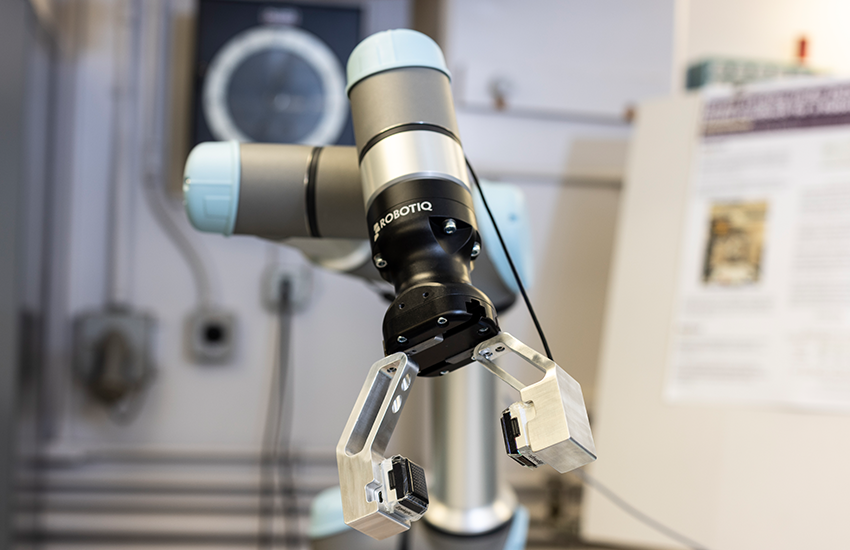A new graduate certificate will teach engineers to use AI and machine learning to model and control dynamic systems.

A robotic arm in the MACS Lab, which investigates theories and practices of dynamic systems and controls. Photo by Dennis Wise/University of Washington
From self-driving cars to advanced robotics, dynamic systems are at the heart of cutting-edge engineering fields. This fall, a new Graduate Certificate in Data-Driven Dynamic Systems and Controls for Engineering will prepare students to harness the power of data, artificial intelligence (AI) and machine learning (ML) to model and control these ever-evolving systems.
The certificate is designed for professional engineers who want to advance their skills and careers. It can be taken on its own or combined with a second certificate to work toward a Master of Science in Artificial Intelligence and Machine Learning for Engineering. Applications are open through July 1.
The instructors include ME Professor Steve Brunton, ME Assistant Professor Krithika Manohar and ME Assistant Teaching Professor Michelle Hickner. Below, Brunton and Hickner share more about the certificate.
What will engineers learn through this program?
Brunton: Engineers will gain hands-on experience with data-driven modeling and control, learning how to optimize system performance using AI and ML techniques. They’ll develop strong mathematical and computational skills that will help them adapt to emerging technologies throughout their careers. Students will also learn how to communicate complex data clearly — through visualizations, presentations and written reports.
Hickner: Engineers will move beyond traditional, equation-based approaches to using data for controls and dynamics. They'll learn to apply data directly — to build models, tune controllers, select sensors and tackle other core tasks in dynamics and control engineering.
Why are these skills important?
Brunton: Almost every industry is utilizing AI, ML and data-driven decision-making to improve efficiency, accuracy, safety and innovation. Engineers who understand how to integrate these technologies into their field will be at the forefront of solving complex engineering problems.
Hickner: Having a combination of traditional engineering knowledge, coding skills and data fluency can be incredibly valuable for engineers as they seek out career opportunities, whether it’s a new job, work project or promotion. Knowing how to leverage companies’ existing data makes work more efficient and helps build better products.
What makes this program innovative?
Brunton: This certificate stands out because it combines foundational engineering skills with cutting-edge ML techniques. It focuses on applying AI to model, optimize and control engineering systems broadly, including fluid dynamics, structural design and materials. Plus, it’s designed for working professionals, offering an online, part-time format that makes it flexible and accessible.
Hickner: The curriculum is designed with flexibility in mind. Students come in with different specialties and experiences, so the first quarter focuses on building a shared foundation — whether that means brushing up on differential equations, coding or study skills. By the second quarter, we dive into more rigorous material. From there, students can tailor advanced projects to their own interests and apply what they’re learning to real-world challenges.
Graduate Certificate in Data-Driven Dynamic Systems and Controls for Engineering
Learn more about the program and apply by July 1.
Originally published May 5, 2025